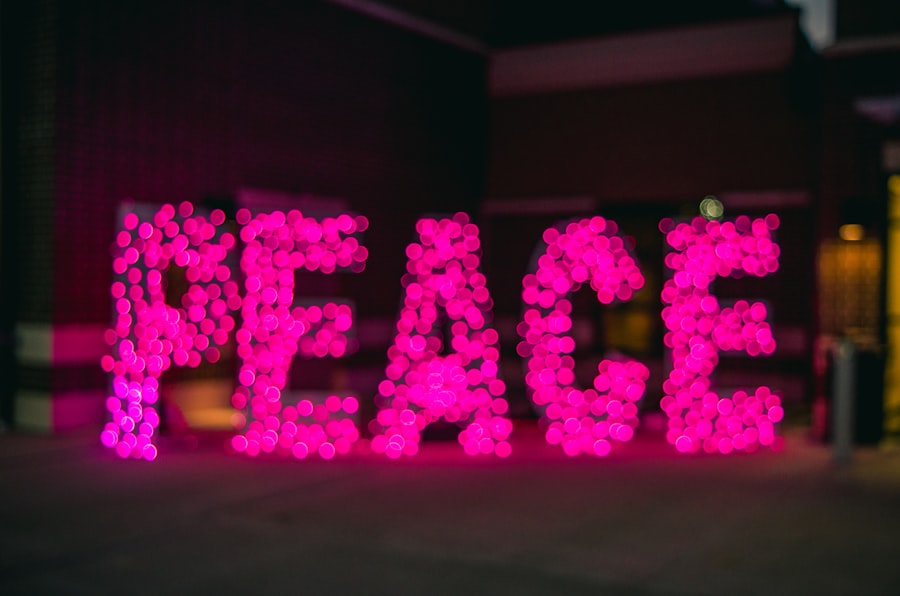Inner peace is often described as a state of mental and emotional calmness, a sanctuary where you can retreat from the chaos of the outside world. It is not merely the absence of conflict or stress; rather, it is a profound sense of tranquility that allows you to navigate life’s challenges with grace and resilience. When you achieve inner peace, you find a balance within yourself that enables you to respond to situations thoughtfully rather than react impulsively.
This state of being is characterized by clarity, acceptance, and a deep understanding of your own emotions and thoughts. However, it is crucial to recognize what inner peace is not. It is not a permanent state of bliss or an escape from reality.
You may still experience moments of anger, sadness, or frustration, but inner peace allows you to acknowledge these feelings without being overwhelmed by them. It is not about suppressing emotions or pretending that everything is perfect; instead, it involves embracing the full spectrum of human experience while maintaining a sense of calm. Understanding this distinction can help you cultivate a more realistic approach to achieving inner peace in your life.
Key Takeaways
- Inner peace is not the absence of problems, but the ability to cope with them in a healthy way.
- Numbing emotions can lead to long-term negative effects on mental and emotional well-being.
- Embracing vulnerability allows for genuine connections and a sense of inner peace.
- Cultivating mindfulness helps to stay grounded and present in the moment, reducing stress and anxiety.
- Acceptance and letting go of control can lead to a greater sense of peace and contentment.
The Dangers of Numbing: Why Avoiding Emotions Is Detrimental
In your quest for inner peace, you might be tempted to numb your emotions as a way to cope with discomfort. This can manifest in various forms, such as excessive drinking, binge-watching television, or even overworking yourself. While these behaviors may provide temporary relief, they ultimately hinder your ability to process and understand your feelings.
Numbing can create a false sense of security, leading you to believe that you are managing your emotions when, in reality, you are merely pushing them aside. Avoiding emotions can have long-term consequences on your mental health. When you suppress feelings, they do not simply disappear; instead, they can resurface in more intense and disruptive ways.
You may find yourself experiencing anxiety, depression, or even physical symptoms like fatigue and tension. By confronting your emotions head-on and allowing yourself to feel them fully, you create space for healing and growth. Embracing your emotional landscape is essential for achieving true inner peace, as it fosters self-awareness and emotional intelligence.
Embracing Vulnerability: The Key to Finding Inner Peace

Vulnerability is often viewed as a weakness, but in reality, it is one of the most powerful tools you can wield on your journey toward inner peace.
This openness fosters trust and intimacy in relationships, enabling you to share your fears and insecurities without judgment.
By embracing vulnerability, you create an environment where healing can occur. Moreover, vulnerability encourages self-acceptance. When you acknowledge your imperfections and embrace them as part of your unique journey, you cultivate a sense of compassion for yourself.
This self-compassion is vital for finding inner peace because it allows you to let go of the need for perfection and embrace the beauty of being human. As you learn to accept your vulnerabilities, you will find that they no longer hold power over you; instead, they become a source of strength and resilience.
Cultivating Mindfulness: How to Stay Present in the Moment
| Technique | Description |
|---|---|
| Deep Breathing | Focusing on the breath to stay present and calm the mind. |
| Body Scan | Bringing attention to each part of the body to increase awareness. |
| Mindful Walking | Consciously paying attention to each step and the sensations of walking. |
| Meditation | Practicing mindfulness through meditation to cultivate present moment awareness. |
Mindfulness is the practice of being fully present in the moment, aware of your thoughts and feelings without judgment. In a world filled with distractions and constant demands on your attention, cultivating mindfulness can be a transformative practice for achieving inner peace. By focusing on the present moment, you can break free from the cycle of worry about the future or regret about the past.
This shift in perspective allows you to experience life more fully and appreciate the beauty in everyday moments. To cultivate mindfulness, consider incorporating practices such as meditation or deep breathing exercises into your daily routine. These techniques can help ground you in the present and create a sense of calm amidst chaos.
Additionally, try to engage in activities mindfully—whether it’s eating a meal, taking a walk, or having a conversation—by paying attention to the sensations and experiences involved. As you develop this habit of mindfulness, you’ll find that it becomes easier to navigate life’s challenges with a sense of clarity and peace.
The Power of Acceptance: Learning to Let Go of Control
Acceptance is a crucial component of inner peace. It involves recognizing that there are aspects of life that are beyond your control and learning to let go of the need to manipulate outcomes.
Accepting situations as they are allows you to respond with grace rather than resistance. This shift in mindset can be liberating; it frees you from the burden of trying to control every aspect of your life. Learning to accept what cannot be changed does not mean resigning yourself to passivity or inaction.
Instead, it empowers you to focus on what you can influence—your thoughts, reactions, and choices. By embracing acceptance, you cultivate resilience and adaptability in the face of adversity. This newfound perspective enables you to approach challenges with a sense of calmness and confidence, ultimately leading you closer to inner peace.
Connecting with Nature: Finding Solace in the Outdoors

Nature has an incredible ability to soothe the soul and restore inner peace. Spending time outdoors allows you to disconnect from the noise of daily life and reconnect with the natural world around you. Whether it’s taking a leisurely walk in the park, hiking through the mountains, or simply sitting by a riverbank, immersing yourself in nature can provide a sense of tranquility that is hard to replicate elsewhere.
The sights, sounds, and smells of nature have a calming effect on the mind and body. Research has shown that spending time outdoors can reduce stress levels, improve mood, and enhance overall well-being. As you engage with nature, take the time to notice the details—the rustling leaves, the chirping birds, or the warmth of the sun on your skin.
These moments of connection can ground you in the present and remind you of the beauty that exists all around you.
The Role of Self-Compassion: Being Kind to Yourself in Times of Struggle
Self-compassion is an essential aspect of finding inner peace. It involves treating yourself with kindness and understanding during difficult times rather than succumbing to self-criticism or judgment. When faced with challenges or setbacks, it’s easy to fall into negative thought patterns that undermine your self-worth.
However, practicing self-compassion allows you to acknowledge your struggles without diminishing your value as a person. By being kind to yourself during tough moments, you create an environment conducive to healing and growth. Self-compassion encourages you to recognize that everyone experiences difficulties; it’s part of being human.
This realization fosters connection with others who may be going through similar experiences and helps alleviate feelings of isolation. As you cultivate self-compassion, you’ll find that it becomes easier to navigate life’s ups and downs with grace and resilience.
Nurturing Relationships: Surrounding Yourself with Supportive People
The relationships you cultivate play a significant role in your journey toward inner peace. Surrounding yourself with supportive individuals who uplift and encourage you can create a positive environment that fosters growth and healing. These connections provide a sense of belonging and remind you that you’re not alone in facing life’s challenges.
Conversely, toxic relationships can drain your energy and contribute to feelings of stress and anxiety. It’s essential to evaluate the people in your life and consider whether they contribute positively or negatively to your well-being. Nurturing relationships with those who inspire and support you can enhance your sense of inner peace by providing emotional support during difficult times and celebrating your successes during joyful moments.
The Practice of Gratitude: Finding Joy in the Little Things
Gratitude is a powerful practice that can significantly impact your overall well-being and sense of inner peace. By focusing on what you’re thankful for—no matter how small—you shift your perspective from scarcity to abundance. This shift allows you to appreciate the beauty in everyday moments and fosters a sense of contentment within yourself.
Incorporating gratitude into your daily routine can be as simple as keeping a journal where you jot down three things you’re grateful for each day or taking a moment each morning to reflect on what brings you joy. As you cultivate this practice, you’ll likely find that it becomes easier to recognize the positive aspects of your life even amidst challenges. Gratitude helps anchor you in the present moment and reminds you that there is always something worth celebrating.
Setting Boundaries: Protecting Your Peace from Negative Influences
Setting boundaries is essential for maintaining inner peace in an increasingly demanding world. Boundaries help define what is acceptable behavior from others while protecting your emotional well-being. By establishing clear limits on how much time and energy you’re willing to invest in relationships or commitments, you create space for self-care and personal growth.
Learning to say no when necessary is an important aspect of boundary-setting. It allows you to prioritize your needs without feeling guilty or overwhelmed by external pressures. When you’re able to protect your peace by setting boundaries with negative influences—whether they come from people or situations—you create an environment where inner peace can flourish.
Seeking Professional Help: When to Reach Out for Support in Finding Inner Peace
While many strategies can help foster inner peace, there may be times when seeking professional help becomes necessary. If you’re struggling with persistent feelings of anxiety or depression that interfere with your daily life or if you’re finding it challenging to cope with overwhelming emotions, reaching out for support can be a vital step toward healing. Therapists or counselors can provide valuable tools and insights tailored specifically to your needs.
They offer a safe space for exploration where you can discuss your thoughts and feelings without judgment. Seeking professional help does not signify weakness; rather, it demonstrates strength and commitment to prioritizing your mental health and well-being on your journey toward inner peace. In conclusion, finding inner peace is an ongoing journey that requires self-awareness, vulnerability, acceptance, mindfulness, connection with nature, self-compassion, nurturing relationships, gratitude practices, boundary-setting, and sometimes professional support.
By embracing these principles in your life, you’ll cultivate a deeper sense of tranquility that empowers you to navigate life’s challenges with grace and resilience.
In the journey to finding peace without resorting to emotional numbness, it’s essential to explore various strategies that promote genuine emotional well-being. An insightful article that delves into this topic can be found on Unplugged Psych, which offers a comprehensive look at how mindfulness and self-awareness can lead to a more balanced emotional state. For more information, you can read the full article by visiting Unplugged Psych. This resource provides valuable guidance on embracing emotions in a healthy way, allowing individuals to experience peace without the need to suppress or numb their feelings.
WATCH NOW! 😔 The Hidden Cost of Forced Positivity
FAQs
What is the concept of finding peace without numbness?
Finding peace without numbness refers to the idea of achieving inner calm and contentment without resorting to numbing or avoiding difficult emotions. It involves facing and processing emotions in a healthy way, rather than suppressing or ignoring them.
Why is it important to find peace without numbness?
It is important to find peace without numbness because numbing emotions can lead to long-term negative effects on mental and emotional well-being. By learning to find peace without numbness, individuals can develop healthier coping mechanisms and build resilience in the face of challenges.
What are some strategies for finding peace without numbness?
Strategies for finding peace without numbness may include mindfulness practices, therapy, self-reflection, and developing healthy emotional regulation skills. It may also involve seeking support from others and building a strong support network.
What are the potential benefits of finding peace without numbness?
The potential benefits of finding peace without numbness include improved emotional well-being, increased resilience, better relationships, and a greater sense of self-awareness and authenticity. It can also lead to a deeper sense of fulfillment and contentment in life.
How can one start the journey of finding peace without numbness?
One can start the journey of finding peace without numbness by seeking out resources such as therapy, self-help books, and support groups. Engaging in mindfulness practices, self-reflection, and building healthy coping mechanisms can also be helpful in starting this journey.




